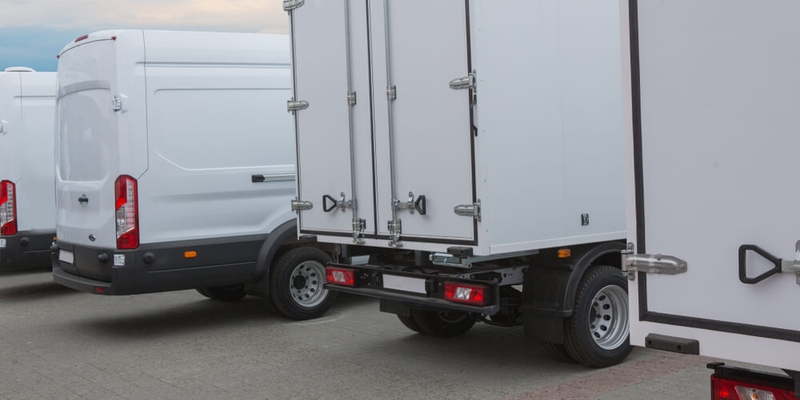
If you are not redirected within 30 seconds, please click here to continue.
Samedi: 10h – 16h HAE

If you are not redirected within 30 seconds, please click here to continue.
If you are not redirected within 30 seconds, please click here to continue.
How to get insurance for your company vehicle?

Table of Contents
If your business relies on a delivery van or a fleet of trucks, you need the right insurance to keep your operations running smoothly.
Commercial vehicle insurance is mandatory by law for any business using vehicles like cars, vans and food trucks. It protects businesses from financial losses due to accidents, theft, and other incidents and covers any potential mishaps employees or volunteers make while using company vehicles.
Here’s how commercial vehicle insurance works, the types of coverage available and how to choose the best policy for your needs.
Why do you need commercial vehicle insurance?
Beyond it being mandatory, there are many reasons why your fleet or company car should have commercial vehicle insurance. Without it, you could end up paying for damages and injuries involving company vehicles out of your own pocket.
In case of an accident involving an employee or passengers, you would likely be responsible for paying for medical bills and legal fees. You would also need to cover any damages, injuries, and possible lawsuits affecting other drivers and property owners.
Commercial vehicle insurance includes collision and comprehensive coverage, which helps pay for repairs or replacements for the car if your work vehicle is involved in an accident, stolen, vandalized, damaged by weather, or hits an animal. Who needs it?
Just like with a personal car, it’s illegal to drive a business vehicle without insurance. And if you use a vehicle for work, you likely need commercial auto insurance.
Bigger vehicles, like dump trucks, especially need this insurance because of their size. Plus, if your business needs higher insurance limits, commercial coverage is usually required.
For example, if you transport goods or people for money, use your vehicle for business tasks like visiting job sites or carrying tools, or if the vehicle is owned by a business or driven by employees.
That means that food delivery drivers, taxi drivers, contractors, maids, caregivers, employees using their own cars for work tasks, and driving instructors all need this coverage.
Read more: I’m a freelancer – do I need freelance insurance?
What are the differences between personal and commercial car insurance?
Personal car insurance is designed for individual use, tailored to the risk profile of the individual and covering comparatively low-risk activities like commuting and leisure travel.
However, business activities and risks are different and often higher, which usually calls for higher premiums. Commercial policies are for businesses, including those with multiple vehicles or specialized work vehicles. Business vehicles spend more time on the road, typically transport more goods, and may require specialized repair. Because of these factors, they may incur higher costs if involved in a collision.
Even if you get into an accident while using your personal vehicle for work, your personal insurance company will not cover the damage, because the heightened risk of the business activity would not have been factored into your premium.
However, if you use one vehicle for both personal and work purposes, you don't need to buy a separate insurance policy. Instead, you can simply add commercial coverage to your current personal car insurance. This way, you stay protected for both personal and business use without the hassle (and expense) of managing two policies.
Read more: Does your car insurance policy include collision and comprehensive coverages?
How much does commercial vehicle insurance cost?
The cost of commercial vehicle insurance can vary significantly, depending on various factors that businesses should consider, such as the driver’s record and miles driven.
The type of insurance, like liability or comprehensive, also affects the price. The kind of business is important too; for example, construction or transporting hazardous materials can lead to higher premiums. Businesses with many past claims might pay more, while those with good safety records and programs might get discounts.
Generally, light commercial vehicles, like cars and vans, cost between $1,000 and $1,500 per year to insure. Their relatively low risk and common usage make them more affordable to cover.
On the other hand, insurance premiums for trucks and heavy machinery typically range from $2,000 to over $5,000 annually. The increased risk associated with their size and the potential damage they can cause contribute to these higher rates.
IMPORTANT NOTE
You can deduct a portion of your insurance premiums for your commercial vehicle on your taxes under Motor Vehicle Expenses. In addition to insurance, you can also deduct licence and registration fees, fuel costs, repairs, and more.
Other types of commercial insurance – such as property insurance for machinery and equipment and business-use-of-your home workspace – are also tax-deductible.
What types of commercial vehicle insurance are available?
When running a business with vehicles, it's important to have the right insurance. Here are the main types of commercial vehicle insurance coverages you can get in Canada:
| Insurance Type | Description | Benefits |
|---|---|---|
| Individually Rated Commercial Auto (IRCA) | Coverage for businesses with at least one commercial vehicle, tailored to each vehicle's needs. | Custom coverage, avoids unnecessary costs. |
| Fleet Insurance | Covers five or more vehicles under one policy, suitable for larger fleets. | Cost savings, easy management for multiple vehicles. |
| Garage Insurance | Protects vehicles temporarily in your care, like those in repair shops. | Protects against risks when vehicles are in your care. |
| Collision or Upset Coverage | Pays for damages from crashes with other cars or objects. | Helps with repair costs, reducing downtime. |
| Comprehensive Coverage | Covers non-crash damages like theft, vandalism, and weather. | Protects against a wide range of damages. |
| All Perils Coverage | Combines collision and comprehensive coverage, includes theft by employees/household members. | Extensive protection against most risks. |
| Employers' Hired and Non-Owned Auto Liability | Covers rented vehicles or those owned by employees but used for work. | Shields business from liabilities with non-owned vehicles. |
Each type of commercial vehicle insurance helps protect businesses from losing money and facing legal issues. By choosing the right coverage, businesses can keep running smoothly, even if something unexpected happens to their vehicles.
What isn’t covered by commercial vehicle insurance
Commercial vehicle insurance typically does not cover the following:
- Your personal vehicle unless it’s being used for business.
- Coverage for rental vehicles often requires additional policies.
- Tools and equipment not permanently installed in your commercial vehicle are usually not covered, but they can be insured under a commercial property insurance policy.
- Items transported in your vehicle are generally not covered, but they can be insured through inland marine insurance, which protects equipment while it’s in transit or stored on-site.
- Employee injuries unrelated to a car accident, which are covered by workers’ compensation insurance, not commercial vehicle insurance.
Are your employees covered under your commercial auto insurance policy?
Commercial auto insurance protects you and your employees who are licensed to drive company vehicles, as long as they are listed on the policy.
It's important to include any employee who regularly uses a company vehicle on your insurance plan to make sure they are covered.
How can you save money?
Just like with personal auto policy premiums, you can reduce insurance costs while keeping good coverage. Here’s how:
Bundle policies: Most insurance providers offer discounts to drivers who combine their vehicle insurance with other business policies like general liability or property insurance.
Increase deductibles: Choose higher deductibles to lower your premiums. Just make sure you can afford the deductible if you need to make a claim.
Review regularly: Check your insurance regularly to make sure it still fits your needs. Update your policy when your business changes, like adding or removing vehicles or changing the type of cargo you transport. Review your policy at least once a year or after big changes in your business.
Lastly, make sure to compare commercial vehicle insurance quotes to find the best rates, and save more on insurance. Remember, investing in the right insurance policy is an investment in the longevity and success of your business.
Get money-saving tips in your inbox.
Stay on top of personal finance tips from our money experts!










